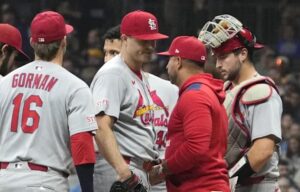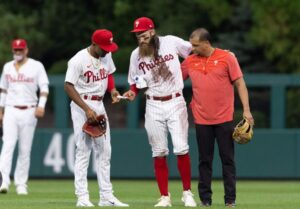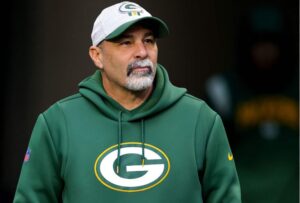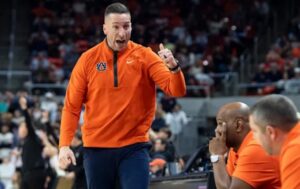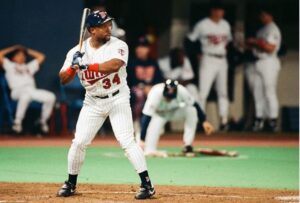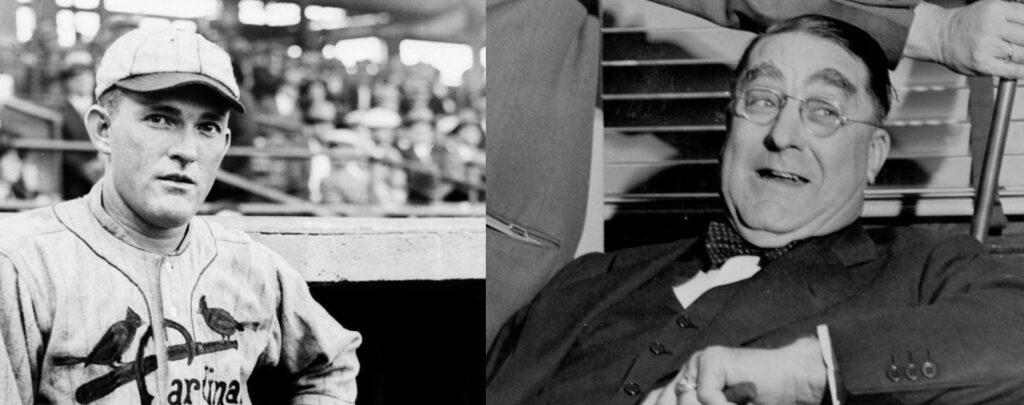
Regardless of whether Branch Rickey was ahead of his time or utterly out of step with the times, Cardinals owner and president Sam Breadon determined that Rickey should no longer be manager.
Rogers Hornsby succeeded Rickey as manager of Breadon on May 30, 1925, a century ago. Rickey continued to work in the club’s front office.
The Cardinals benefited from the reorganization. In 1926, player-manager Hornsby guided them to their first World Series victory and National League pennant. Vice President Rickey made the Cardinals a consistent competitor by concentrating on baseball operations.
On shaky ground
Rickey joined the Cardinals in 1919 after managing the St. Louis Browns from 1913 to 2015. He led the team to three successful seasons in his first six years: 1921 (87-66), 1922 (85-69), and 1923 (79-74). The Cardinals then took a significant step backward, attracting just 272,885 at home games and finishing 65-89 in 1924.
According to writer John Wray of the St. Louis Post-Dispatch, Rickey volunteered to retire during 1925 spring training, knowing that Breadon was thinking about a move, but he changed his mind. According to Rickey, “I can see this team I put together winning the flag,” he told Breadon. “I want another shot, and I have the things here. Since I put together all of my talent, I believe I deserve it.
Breadon didn’t believe it. According to Hornsby’s memoirs, “My War With Baseball,” Rickey asked him for assistance with Breadon. According to Hornsby, “I went to Breadon and said that Rickey was the smartest man in baseball.” “Breadon recommended that I accept the position as manager, but I had no interest in doing so.”
Breadon had already offered Hornsby the position before spring training concluded, but he turned it down. “I suggested that Breadon retain Rickey,” Hornsby wrote in his memoirs. Additionally, I informed Breadon that he couldn’t do much better if the Good Lord himself were to oversee this club. It was a terrible squad.
Decision time
The 1925 Cardinals lost seven straight games at home in front of largely tiny audiences after winning five of their first eight games.
Breadon appeared while the Cardinals were at Pittsburgh for a series against the Pirates. Clarence Lloyd, the traveling secretary, approached Hornsby while he was eating breakfast at the Hotel Schenley on Friday, May 29, and informed him that Breadon wanted to meet. According to Hornsby’s memoirs, Rickey told him, “Breadon wants you to manage the team,” as he walked past the table where he and coach Burt Shotton were seated.
In response, Hornsby said, “I don’t want to manage.” He is aware of that.
“So, are you going to ask Breadon to give me another opportunity?” Hornsby heard Rickey say. “If he refuses, try to persuade him to allow Shotton to take over as manager.”
“All right,” Hornsby replied.
(Before signing his first professional contract, Rickey made a vow to his mother that he would not play baseball on Sundays, thus Shotton managed the Cardinals on Sundays in addition to instructing.)
After meeting Breadon in his room, Hornsby received an offer of employment. “No,” Hornsby answered.
“I won’t have any goddamned Sunday school teacher running my team,” Breadon said, according to Murray Polner’s book “Branch Rickey: A Biography.” You intend to run it.
According to Hornsby’s memoirs, he spoke with Breadon about the following:
Hornsby: “You mean, Rickey’s through?”
Breadon: “That’s exactly right _ as manager.”
Hornsby: “What about Shotton as manager?”
Breadon: “I don’t want any Rickey man either.”
It was decided that Hornsby should consider the suggestion and let Breadon know the following day. In his memoir, Hornsby recounted, “I went back down and told Rickey what Breadon had said.” “Rickey got really upset and threatened to sell all of his Cardinals stock, but he didn’t swear or anything.”
Rickey told Hornsby, “Judas priest, the man (Breadon) is stabbing me in the back,” according to the Rickey biography.
Hornsby hit a two-run home run at the ballpark that day, but the Cardinals lost, falling to 13-23. It ended up being the final game Rickey would play. Boxscore
Making the switch
On Saturday, May 30, Hornsby visited Breadon and informed him that “the only way I would be interested in becoming manager would be if I could buy Rickey’s stock,” according to his memoirs. Then I could make baseball my life’s work. He was promised by Breadon that it will be set up. Hornsby would take over as player-manager on Sunday, May 31, the two decided. Breadon told the Associated Press, “I expect him to give the Cardinals new fight.”
“The pupil succeeds the master,” wrote James M. Gould of the St. Louis Star-Times in an article on the administrative change.

At the age of 29, Hornsby was appointed the National League’s youngest manager. Bucky Harris, a 28-year-old player-manager for the Washington Senators of the American League, was a few months his senior. Dave Bancroft of the Braves, Ty Cobb of the Tigers, Eddie Collins of the White Sox, George Sisler of the Browns, and Tris Speaker of the Indians were among the other player-managers in the big leagues in 1925.
Breadon told the Post-Dispatch, “I think we have one of the best combinations in baseball with Rickey as vice president and business manager and Hornsby as playing manager.”
“Rickey is a valuable man and we want to utilize his knowledge of baseball and his great judgment of players,” he also told the Associated Press. His area of expertise is construction and organization.
However, Rickey, who was upset at losing his position as manager, was not placated by Breadon’s remarks. Rickey’s biography states that he called Breadon’s behavior “clumsily brutal.”
Murray Polner, the author, claims that Rickey felt deceived and contemplated quitting the Cardinals to take a position as athletic director at Northwestern University, but his wife Jane dissuaded him.
According to author Mike Mitchell’s book “Mr. Rickey’s Redbirds,” Rickey subsequently stated, “My fault as a manager … was due to my apparent zeal.” I talked about the game every day, as though it were the most important game of the year.
According to “Mr. Rickey’s Redbirds,” coach Shotton was given the responsibility of leading the Cardinals in the May 30 Saturday doubleheader in Pittsburgh, because Rickey was out and Hornsby took over on May 31. In Game 2, the Pirates scored eight triples to win both games. Boxscore
Rickey’s reviews
The majority of responses to the managerial change were positive:
_ J. Roy Stockton, Post-Dispatch: “Under Hornsby, the Cardinals should perform well.” He won’t be too controlling of the group. If Branch Rickey’s administration could be fairly criticized, it would be that he overburdened the squad with managerial duties. He made an effort to catch for the catchers and pitch for the pitchers. When leading his soldiers, he lacked composure. After deciding on a course of action, he paused, considered the risks, and modified it.
_ Brooklyn Eagle Tommy Holmes: “Some blame Rickey’s attempt to control the Cardinals for the team’s demise. He wanted to go through every idea that needed to be done for the team. Branch used his wagging from the bench to enforce the batter’s persistent contact, exercising his managerial power. When the bases were full, a batter had to stretch his neck to get the signal on each ball pitched in order to bust it and nothing else.
“Rickey had a lot of trick ideas about handling a ballclub that made some of the older athletes feel like they were being treated like children,” said Henry Farrell of United Press. He expanded his teaching practice to include math and grammar school arts and sciences in addition to his baseball-related Blackboard presentations.
According to John B. Foster of the Dayton Daily News, “Rickey’s biggest flaw was… his lack of playing instinct.” Usually, he was able to switch pitchers at the incorrect moment. Nearly all of the National League’s managers realized that he had made a mistake at the wrong moment. If opposing managers had Rickey switch pitchers, they believed they would win games.
_ The Sporting News: “The most popular decision that could have been made for the fans was Hornsby’s promotion to management.”
Different approach
When Hornsby was taken to the plate by St. Louis Mayor Victor Miller and given a number of floral arrangements before to the commencement of his managing debut on Sunday, May 31, the fans did indeed give him a warm ovation. “A new spirit exhibited by the players” and “a dash that had been missing for some time” were reported by the Post-Dispatch during the game. Hornsby helped the Cardinals defeat the Reds 5-2 with two hits, two walks, two runs scored, and an RBI. Boxscore
Hornsby began Jesse Haines against the Reds the next day. Haines lost all four of the games he started for Rickey in 1925 after being pulled from them. Pitching a full game, he won his first start for Hornsby. Boxscore
A week later, Hornsby invested $50,181 in 1,167 shares of Rickey’s Cardinals stock at $43 each, according to the St. Louis Globe-Democrat. According to author Mike Mitchell, Rickey took a snap choice because he was upset at losing his position as manager.
In the meanwhile, Hornsby called off the regular morning exercises and team meetings that had been a regular feature of Rickey’s management. Hornsby told the Star-Times, “You can’t practice for two hours and then go out in the afternoon with all your energy and play some more.”

